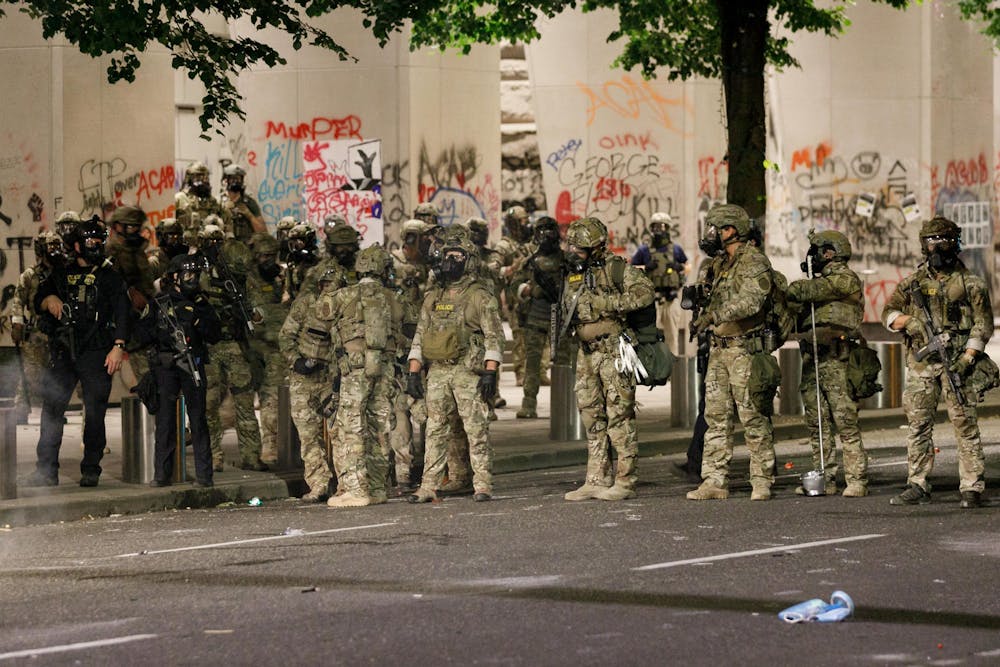Calls to defund the police, establish mutual aid networks and other efforts to reduce contact with and reliance on state power ultimately issue the same challenge: We live in a state defined by its violence. Let’s organize ourselves without it.
I was first taught the definition of the state as the entity which has a monopoly on legitimate violence in a high school philosophy class. That phrase has stuck with me and continued to rub me the wrong way ever since. As a student of political science, I find myself face to face with it with relative frequency.
To state the obvious: The commonly accepted definition of the state is inherently violent. Under this definition of the state, to be governed is to be violently coerced into behaving a certain way — either literally, or via the knowledge that supposedly legitimate violence may be done to you if you step out of line.
After over a month of following coverage of the protests in the wake of George Floyd's death, specifically the sustained protests in Portland, Oregon, my uneasiness with the acceptability of this definition of the state is easier to articulate. Can we call state and state-sanctioned violence, including the cruel and excessive use of force and chemical weapons by police, legitimate?
In Portland, our fellow Americans are fighting against a violent, unaccountable federal occupation, being thrown into unmarked vans by federal agents and otherwise having their constitutional rights violently violated. Can we truly call what is happening there, including violations of the First and Fourth Amendments, an exercise of legitimate violence?
I will no longer accept a definition of society that accepts any of that as legitimate, and I never should have. Portland reminds us that if we want to live as free people, we have to reconsider whether we want to live in a world where horrific state violence, from the day-to-day use of excessive police force all the way up to federal occupation, are considered legitimate and necessary.
Perhaps violence is truly an inherent feature of statehood, and the nonviolent alternative would be anarchy. However, I am not sure anyone has tried all that hard to conceptualize an alternative way of seeing and structuring a state. Since the death of George Floyd, many Americans are encountering ideas like police abolition and prison abolition for the first time. And for those who are getting on board, or who are deciding if they would like to, many questions remain.
Many of the questions that come to mind immediately are well-documented, obvious and widely engaged with. You know them: What about violent crime? Will there be no one to call in case of emergency? But the contradictions we carry within ourselves are less often discussed, perhaps because they are less often perceived.
We have a deeply ingrained impulse to punish, rather than assist or rehabilitate, our fellow citizens. Defunding or abolishing the police will not be possible if we do not also abolish our impulse to police, if we do not also begin to conceive of justice as separate from incarceration and punishment.
As this 2019 article from the New Yorker examining America's rage at Jussie Smollett states, “To stem the tide of mass incarceration, we must get comfortable with less punishment, even for some of the people we find morally reprehensible.”
If we want to live in a society that is nonviolent, or that is at least less violent today than it was yesterday, we have to be comfortable with less punishment. We have to ask: What could the social contract mean without a coercive apparatus? What could the state and its laws mean without violence? Do we want to live and die in a police state or under military occupation by our own government, in the land of the free?
I do not have the solutions. As misguided as I find our common definition of the state to be, I am ultimately still a student of it. But I do know that we should work toward answers and solutions, guided by those who have been doing this work for decades. Alongside them, we should seek to build a country and a world in which we do not have to define the way we organize ourselves by violence.
Kaitlyn Radde (she/her) is a junior studying political science. She plans to pursue a career in academia.






